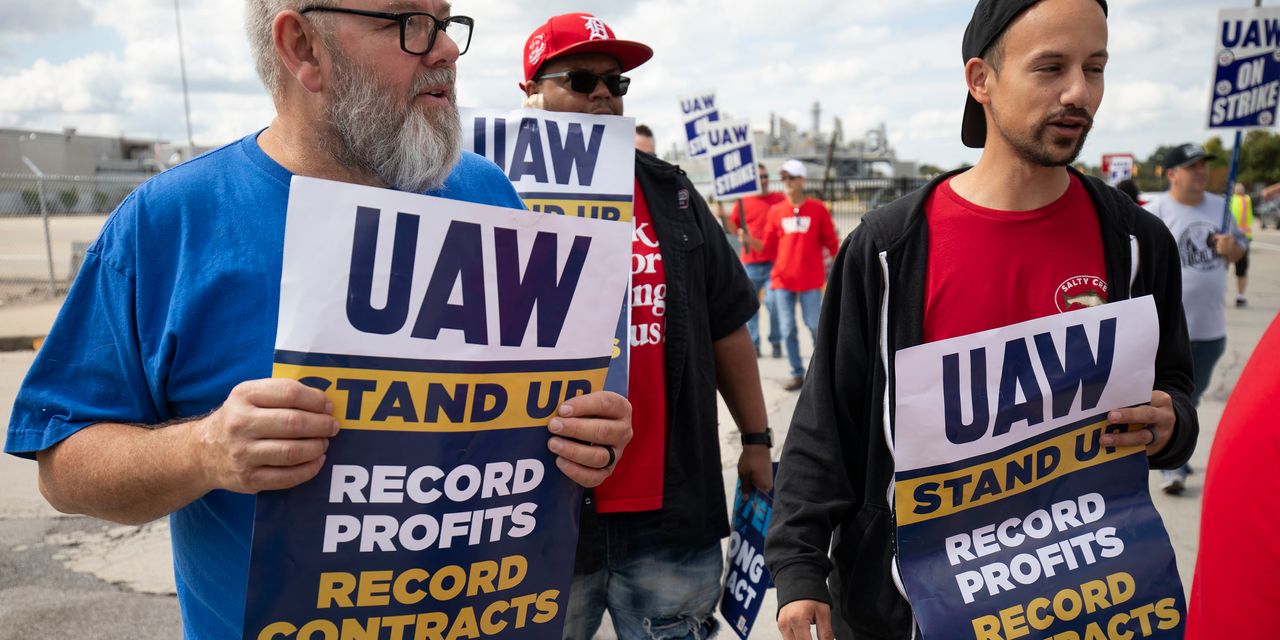Striking United Auto Workers want better wages, improved job security, retiree pay increases, and a 32-hour work week that could turbocharge broader acceptance of shorter work weeks.
Right now, nearly 13,000 UAW workers have walked off the job at Ford Motor Co.
F,
General Motors Co.
GM,
and Jeep and Chrysler parent Stellantis
STLA,
still considered the influential Big Three for car makers.
If the union gets a win from on its 32-hour work week demand, that could be a big deal for momentum behind the broader four-day work week movement, experts say.
Four days of work is “still in the early-adoption phase,” said Alex Soojung-Kim Pang, director at Four Day Week Global, where he advises companies considering how to implement a curtailed traditional work week.
A UAW win on the 32-hour demand “would help move the four-day week from being something you do if you have a bold leader and you want to stand out in your industry, to a mainstream aspiration for every worker and business owner,” said Soojung-Kim Pang.
“A lot more people can look at the four-day week and say if they are doing this in an auto factory, I absolutely can do it here in my small plant, or in my business,” he added.
Even if the 32-hour work week doesn’t make it to the final deal, it’s a “game changer” that the demand is there at all, he said. The demand could plant the idea in labor talks far beyond the UAW-company standoff.
A UAW win on the 32-hour week would cause a “massive reverberation,” said Cathy Creighton, of Cornell University’s School of Industrial and Labor Relations.
The demand’s presence is a sign of the COVID-19 pandemic’s lasting effects, said Creighton. While five days of in-person office attendance seems like a thing of the past, “we’ve had fundamental changes in how workers and employers view work life and work-life balance.”
Many factory workers may not be able to pull off remote work but they can press for a shortened week on the physically demanding work, she noted. Historically, the UAW was one of the first unions to deliver health benefits, vacation and pensions for its members, she noted.
“I think the labor movement has been playing it safe for a long time, and now they are not,” Creighton said. The UAW’s 32-hour work week demand is a prime example, she said. “The five-day work week is so ingrained in our psyche that to think of something different is like an earthquake.”
Some research indicates people are ready for a shake-up. Nearly six in 10 people who work five days say they would prefer four 10-hour days, according to an August poll in an ongoing look at worker attitudes run by academic researchers.
“We all know that living in a plant seven days a week, 12 hours a day, isn’t a living at all. We need real work-life balance. Auto workers deserve a life,” UAW president Shawn Fain told members in a video update days before the targeted strike.
Roughly 12,700 UAW members so far have walked off the job at a Ford Motor plant in Michigan, a GM plant in Missouri and an Ohio plant for Stellantis NV, the maker of brands like Dodge, Chrysler, Jeep and Ram Trucks.
Of course, there’s no guarantee how far the demand gets. The companies have counter proposals for the array of union asks, as a chart shows from researchers at Evercore ISI. They don’t yet have counters on the 32-hour work week.
Switching to a 32-hour week with a 40-hour pay rate would be a sharp labor cost on top of the wage increases the UAW is already seeking, a Stellantis spokeswoman said. It would require hiring at least 25% more workers to stick with current manufacturing schedules, she said.
“We are extremely disappointed by the UAW leadership’s refusal to engage in a responsible manner to reach a fair agreement in the best interest of our employees, their families and our customers,” the company said in a statement.
In a statement, GM said it was “disappointed by the UAW leadership’s actions, despite the unprecedented economic package GM put on the table, including historic wage increases and manufacturing commitments.”
Ford did not respond to a request for comment.
“It’s a big game of chess that Shawn Fain is playing. We’ll see how it turns out,” Creighton said.
“Even if they don’t get the four-day week this time, there are going to be other moves in this game in the future,” from the UAW and beyond, Soojung-Kim Pang said.
“Even if you have to give on the four-day week now, that doesn’t mean you give on the four-day week as an ideal or a goal.”
Read the full article here





